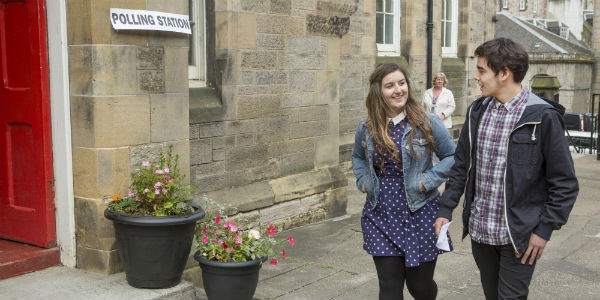It came too late for this general election – but Parliament has passed legislation that will mean that universities will again have to play a role in registering their students to vote. Toby S James, Chris Rennard and Josh Dell explain why this is likely to have a profound effect on young people’s turnout.

Media attention quickly moved from Westminster to the campaign trail after the snap general election was called and Parliament was dissolved. Legislation continued to be debated and amended right up to the wire, however, and this includes legislation that is vitally important to electoral process itself. This included two amendments that will mean that universities will have to play a role in voter registration. This could have a profound effect on voter turnout and registration levels among students in the future.
Amendments 15A and 15B to the Higher Education and Research Bill will require universities in England to undertake any steps that the Office for Students (OfS) sets out to work with electoral officials to register students.
Previous Electoral Commission research has estimated that there are up to 8 million eligible voters missing from the electoral register. Students have become one of the most under-registered groups in the electorate. Research predicted that they would have been one of the most affected by the recent move to individual electoral registration (IER). Under the old household electoral registration system, they were automatically enrolled by their university. Now they have to register themselves each year.
As one of the most mobile and transient groups, they lend themselves to being missed off the register. Although data on the number who have fallen off the register as a result of IER is hard to track, we know that young people were especially affected.
The introduction of online voter registration and voter outreach work from organisations such as Bite the Ballot did much to address this in the run-up to the EU referendum. But now the referendum is over, we should expect the completeness of the register to have slid away again. Many of the young people who registered for the EU referendum may no longer be on the register, if they have moved.
Innovations at different universities have shown how registration rates can be quickly boosted. Student registration rates were reported to have soared to 76% at the University of Sheffield compared to 13% at similar-sized institutions following a pilot where students were offered the opportunity to register to vote at the point of enrolment or re-registration as a student at their university.
A victory for campaigners
The reform is victory for those who have been campaigning to introduce policies to tackle under registration. Last year, the All Party Parliamentary Group on Democratic Participation published a report on the problem of the Missing Millions and set out 25 reforms that could be introduced. The amendments go some way to introducing recommendation 3 of that report.
https://twitter.com/appgDP/status/857921511855972352?ref_src=twsrc%5Etfw&ref_url=http%3A%2F%2Fwww.democraticaudit.com%2F2017%2F05%2F02%2Ftoo-late-for-ge2017-but-now-universities-will-have-to-play-a-role-in-registering-students-to-vote%2F
There remains scope for further work in the next Parliament. The directions that the OfS can give universities will be subject to direction from the Minister of State. The amendment has therefore introduced a mechanism for improving voter registration, but the government will remain the gatekeeper of those provisions. The amendments apply only to England. Moreover, there are many other reforms that can be introduced to improve voter registration, as set out in that Missing Millions report. The government has still failed to introduce a system for checking online to see if you are already registered (as regularly demanded by APPG Co-Chairs Lord Rennard, Caroline Lucas and others). This means that people unsure if they are registered should fill in the simple online registration form on the government website before midnight on May 22. The duplicate applications that follow are a major drain on the resources of electoral registration officers, research shows.
But for now, there has been an important but unnoticed step forward for student registration, which could have a profound effect at future general elections – if not this one.
This post represents the views of the authors and not those of Democratic Audit.
Dr. Toby S. James (left) is a Senior Lecturer at the University of East Anglia and Lead Fellow on Electoral Modernisation to the All Party Parliamentary Group on Democratic Participation.
Lord Chris Rennard is Co-Chair of the All Party Parliamentary Group on Democratic Participation.
Josh Dell is part of the leadership team at Bite The Ballot, focusing on communications and advocacy.
Image credit: Electoral Commission
This article was originally published on Democratic Audit.
Read the original article.





